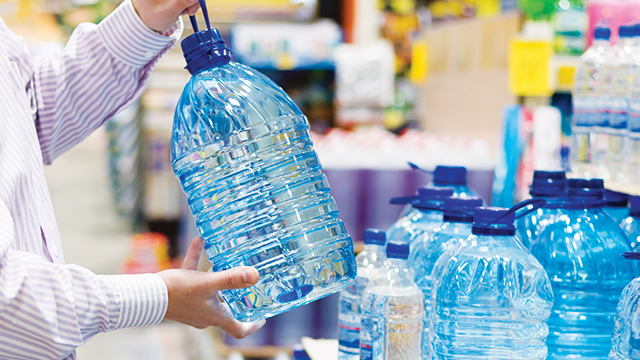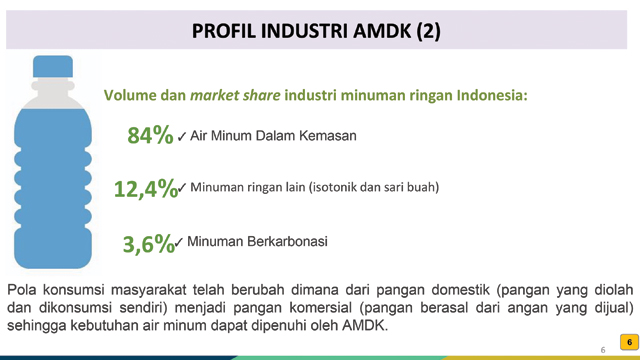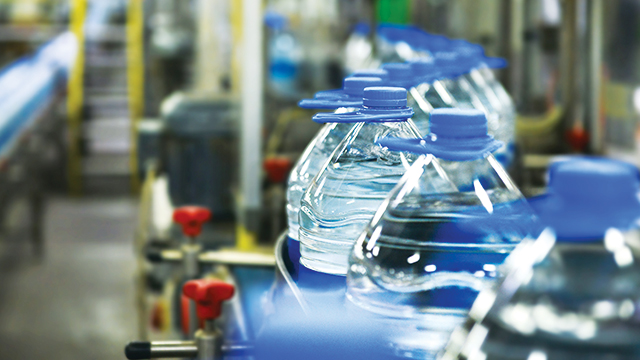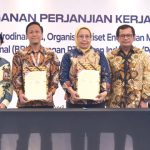Jakarta (Greeners) – The massive production of bottled drinking water (AMDK) processed in the market adds pollution load to the environment. Amidst the effort to reduce plastic packaging, some mineral water companies choose to use single-use gallons. Indonesian Consumer Foundation (YLKI) strongly opposes this practice. According to YLKI’s Executive, Tulus Abadi, the companies’ move is clearly against the single-use control in food and beverage products that the government proclaims. Moreover, he continues, despite the Extended Producer Responsibility (EPR), bottled mineral water producers have yet to withdraw their product packaging. Namely the 300 ml, 600 ml, and 1.5liter packaging.
“We strongly oppose the practice. The government and related institutions should prohibit disposable food and beverage containers due to environmental considerations,” said Abadi to Greeners by phone on Thursday (17/09/2020).
Also read: Carbon Footprint in Household Cleaning Products
KLHK: Industry Should Try Their Best to Limit Single-use Packaging
Commenting on the issue, Novrizal Tahar, Director of Waste Management at the Ministry of Environment and Forestry (KLHK), clarifies that single-use gallons have met Indonesian National Standards safety aspects of the Ministry of Industry and the Food and Drug Administration.
However, he continues, in terms of packaging management that have the potential to become waste, producers need to refer to the Minister of Environment and Forestry Regulation Number P.75 of 2019 concerning the Roadmap for Reducing Waste by Producers. Based on the regulation, each producer, including the AMDK industry, is responsible for reducing packaging waste in ten years by 30 percent.
“In Permen (Ministerial Regulation) 75/2019, there is also a hierarchical context for waste reduction. Reduction, reuse, and recycling. On top of the hierarchy is reduction. The AMDK industry should try their best to limit single-use packaging,” Tahar explains.
Thirty-One Percent of Producers Use Single-use Gallons
Moreover, Tahar admits that 69 percent of the bottled water industry ruses their gallons, while 31 percent choose single-use gallons. Tahar also appreciates the industry that has educated the public or its consumers by encouraging the reuse of gallons. It has formed a mindset in society that they need to reuse gallons repeatedly.
“Since there is a concern about single-use gallons, we as the government will push as much as possible to ask producers to increase the reuse habit further. We aim to reduce the waste it generated. If it has entered the landfill, it will become a new waste problem,” Tahar adds.
To this day, his institution is still monitoring news from the local government regarding environmental problems from single-use gallons.
“If our colleagues in the regions find this single-use gallon to be a new problem, we will certainly take action against it,” he said.
To follow up on the development of the EPR or Ministerial Regulation Number 75/2019, Tahar continues; currently, all producers are making a baseline and planning.
“We hope that producers can convey their planning process by the end of this year. Therefore, by next year producers can carry out the pilot plan. By 2022 it will be fully implemented,” he pronounces.
YLKI Urges Consumers to Choose Products Wisely
Meanwhile, another YLKI Executive, Sularsi, said that the industry has a social responsibility to the products they produce. When they choose to use single-use plastic packaging, she continues, the producers are obliged to collect the used packaging.
She reminisces that people used to use cups for drinking. However, after the existence of bottled drinking water, people switched to something more practical, which became a new necessity.
“Changing people’s behavior is the success of business actors. On the other hand, producers do not think about moral and social responsibility by creating product packaging waste and polluting the environment, “said Sularsi.
Accordingly, YLKI also invites consumers not only to see a product for personal benefit. Instead, consumers need to educate themselves, whether the product violates the rules or not.
Also read: NGO Urges Global Climate Fund for Indigenous Peoples
Moreover, Sularsi defines five pillars of the consumer movement. First, care for society and itself with the value of money, goods, and the value of humans. Second, protect nature and the environment.
“This means that if you consume a product, you will also look at the environmental impact,” she argues.
Third, consumers need to know and fight for the existence of rights that apply universally, including human rights and the right to fulfill basic needs.
“It means that a company that produces a product should never violate its labor rights,” she adds.
Fourth, fighting for justice for political and economic systems that marginalize weak and poor consumers. Last, the consumer movement aims to rally strength by mobilizing people’s energy through various activities by building solidarity.
“Consumers can choose which products are good or not. Consumers also have responsibility for the products they own and use,” Sularsi concludes.
Writer: Dewi Purningsih
Editor: Ixora Devi





















































